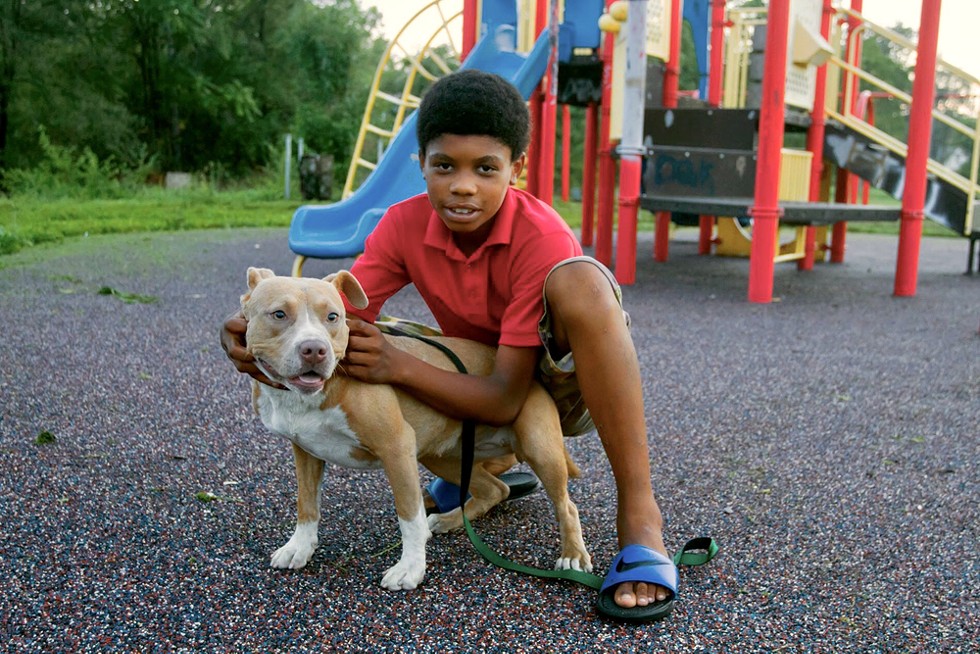Emma Hernandez, a 9-year-old girl who loved to play outside, was riding her pink bike near her home on Detroit's west side when three undernourished pit bulls leaped over a neighbor's flimsy fence and attacked her in August.
Neighbors heard Emma scream and rushed to help, hurling bricks and other objects at the dogs. As the dogs fled, Emma's dad, Armando Hernandez, ran to the rear of his home and found his daughter.
"I picked her up in my arms and I couldn't believe she was just lifeless," her father said a month later during a court hearing for the dog's owner, Pierre Cleveland, who has been charged with second-degree murder and involuntary manslaughter. "I started crying. I can't believe my baby's gone."
Hernandez attempted CPR on his daughter and used a T-shirt to try to slow the blood spilling from a large gash in her neck. It was too late.
Emma was pronounced dead less than a half hour after the attack. The cause of death was a fractured cervical spine.
"Your dogs just killed my daughter," Hernandez says he told the owner, who had just returned home after a trip to the store.
Just eight days after Emma's death, two pit bulls slipped under a fence in Southwest Detroit and killed a small dog and injured his owner, Jimmy Sanchez.
Since January 2017, more than 1,250 dog bites have been reported in Detroit.
In the city's neighborhoods, vicious dogs are all too common — a perilous consequence of irresponsible pet owners and a city without the resources to adequately handle an abundance of neglected and stray canines.
None of this surprises Theresa Sumpter, director and founder of Detroit Pit Crew Dog Rescue, which routinely picks up neglected dogs roaming around the city — a job that should belong to the notoriously understaffed Detroit Animal Care and Control. In the six years that Sumpter's rescue group has been picking up and caring for strays, she has observed a dangerous pattern: People neglect and abuse their dogs, and the city fails to do much about it.
"With no consequences, people just continue to abuse these animals," Sumpter tells Metro Times.
In a good home, pit bulls — like any dog — can be docile and obedient companions. But in the wrong environment, they can be extremely dangerous. Pit bulls, or "bully breed" dogs, include square-jawed breeds like the American Pit Bull Terrier, American Staffordshire Terrier, American Bully, and Staffordshire Bull Terrier. The dogs, or dogs that are mixed with those breeds, are very popular in Detroit.
Sumpter estimates that 90% of the dog bites in Detroit are the result of companion dogs that "haven't been properly trained" or are left outside on chains.
"They're made to be mean or made to be protective because people want them to protect their property," Sumpter says. "In general, that can make a dog become very territorial and very protective because they make that their job. So if you enter that property or if the dog gets off the property, yes, they can definitely be harmful to the community."
Cracking down
In April 2017, city officials adopted a tougher dog ordinance aimed at preventing maulings after pit bulls attacked and killed 4-year-old Xavier Strickland in front of his mother, Lucille Strickland. Through an opening in a fence, the dogs snatched the boy from his mother's arms, dragged him under the fence, and brutally mauled him for nine minutes.
The Strikland family said they had warned the neighbor, Geneke Lyons, about the dogs getting out of the fence in the past and once attacking Xavier's 9-year-old sister. Lyons was convicted of involuntary manslaughter and sentenced to a year in jail with work release and five years of probation.
City officials pledged to get serious about neglectful owners. In the summary of the revamped ordinance, the new law was intended to "demonstrate the commitment by the City of Detroit that the circumstances which led to Xavier Strickland's tragic death are adequately and permanently corrected."
At the time, dog rescue groups applauded the ordinance as a strong step forward. Under the new law, pet owners must monitor their dogs and cannot tether them for more than three hours. Owners also are prohibited from letting their dogs loose without secure fencing.
To give the ordinance teeth, the city empowered animal control and police officers to seize dogs that are neglected or not properly secured. Follow-up inspections are also required.
But the problems persisted: Neglected dogs were still unrestrained in yards with inadequate fencing.
Had the city enforced the ordinance, Emma may still be alive.
Since 2005, at least six people have been mauled to death by dogs in Detroit. The victims ranged in age from three weeks old to 91 years old.
tweet this
In November 2017, just seven months after the new ordinance was adopted, Armando Hernandez said that police came to his house after he called about the dogs being loose. But, he told WWJ-950AM, police "didn't follow up on it."
"The dogs stayed loose, wild, and the guy didn't feed them," Armando Hernandez said.
In March 2018, animal control officers responded to a complaint about two of the dogs roaming free, but failed to do anything because the owner wasn't home, city officials confirmed.
The lack of enforcement goes beyond the dogs that killed Emma. Between June and September 2018, the city issued no tickets for violations under the new ordinance, according to public records obtained by Detroit Pit Crew Dog Rescue.
"They can't even enforce the laws that are on the books," Sumpter says.
"With no consequences, people just continue to abuse these animals," she adds.
Two weeks after the attack, City Council President Brenda Jones, who worked on the tougher ordinance, lashed out at Mayor Mike Duggan's administration for not enforcing the law.
"People are losing their lives. When does this stop?" Jones angrily asked during a Sept. 3 council meeting. "We can write the laws all day long, but if there is nobody enforcing the laws it doesn't matter, and clearly that's what is happening. No one is enforcing the laws on the books."
Jones added, "I'm livid. I'm mad. I'm hurt."
Jean Ingersoll, Detroit's interim health director, said Duggan's administration is "working diligently" to "put together the best, strongest ordinance possible."
Inadequate staffing
Detroit Animal Care and Control handles nearly 500 animal complaints a week, runs a shelter, and provides other services.
For years, the department has been notoriously understaffed and unable to respond promptly to calls about dangerous dogs. But last year, the city increased the department's budget from $2.6 million to $3.3 million and recently hired nine new animal control officers, bringing its staff to 19.
But even that isn't enough.
On most days, the animal control officers are only available for five hours, from 10:30 a.m. to 3:30 p.m. The department recently extended its hours from 7 a.m. to 7 p.m. from Tuesday through Thursday. But shortly after 4 p.m. on a recent Tuesday afternoon, no animal control officers were working when police reported "two people being chased" by a dog, according to police radio traffic.
Animal Care and Control spokeswoman Tamekia Nixon says the department will expand its hours to 7 a.m. to 7 p.m. seven days a week early next year and be staffed with 14 officers and seven investigators.
"That's 21 trained officials ready to protect the health and safety of Detroiters, respond to citizens' complaints, pick up stray dogs, and write tickets to enforce city ordinances," Nixon tells Metro Times. "The increased patrol, community presence and enforcement will help curb the number of dog bites."
When animal control officers aren't available, the responsibility to respond to dangerous dog complaints falls on police officers, who are often too busy to respond in a timely fashion to the most serious crimes. A quick response time is critical if someone is being chased or cornered by a vicious dog.
An analysis of emergency records found that Detroit police averaged 14 minutes and 18 seconds to respond to the most violent and urgent urgent crimes in 2018. Response times to priority two calls, which typically involve emergencies such as dangerous dogs, robberies, and hit-and-run crashes, were a whopping 54 minutes and 42 seconds.
Until recently, some police precincts didn't even have catch poles used to contain dogs.
When police capture dangerous dogs, the canines are transported to the city's shelter in the rear of patrol cars.
Handling dog complaints can tie up police, making them unavailable for other emergencies in a city with the highest violent crime rate in the nation. In the late morning of Sept. 5, police chased three loose pit bulls across several streets for nearly an hour in Southwest Detroit until animal control officers arrived. About 10 minutes later, at 11:29 a.m., police officers in another part of the city were sent to a reported dog attack. It was the fifth call about dangerous dogs in a three-hour period in which animal control officers weren't immediately available.
Revolving door of directors
In the past four years, the city has gone through three Animal Care and Control directors and hired its fourth in early September. The department had been without a director since May.
The new director, Mark Kumpf, has a checkered past. He was fired from his longtime job as animal resources director in Ohio's Montgomery County following several lawsuits, one of which alleges he and his department were negligent in the 2014 mauling death of 57-year-old Klonda Richey and then destroyed records in the case. The victim's family says that Kumpf, the county, and its animal resources center failed to act after Richey called to complain about the dogs at least two dozen times. According to the family's attorney, Richey "was brutally and savagely killed by dogs as a result of Mark Kumpf's failure to fulfill his statutory duties and heed her many, many, many pleas for help."
The lawsuit also alleges Kumpf and his department destroyed "key documentary evidence" in the case in violation of the law.
Last year, animal control officers picked up 4,136 homeless dogs — an average of more than 11 a day.
tweet this
Kumpf also came under fire for the county's high euthanisia rate and the crowded, deplorable conditions at the shelter, where some dogs were stuffed in cages filled with their own feces. According to a scathing report by Team Shelter USA, the county's shelter was manipulating records and not doing enough to adopt healthy pets that were later put to death. Employees were mistreated, creating distress and a high turnover rate, the report states. Inspectors witnessed inhumane practices, such as "dogs being dragged by their neck with a rabies pole." The stench of "deceased bodies thawing in the freezer" was so strong it reached beyond the euthanisia room.
Kumpf declined to be interviewed by Metro Times, and his department would only answer questions via email.
City officials defended the hiring of Kumpf.
"We hired Mark based on his 30-year career, during which he has been widely recognized for his abilities and accomplishments," health officer Denise Fair says in an email. "He was recommended by and has the strong endorsement from the Michigan Humane Society. We support him 100 percent and will continue to."
Fair added: "We know that there are concerns among certain animal welfare groups, primarily ones based far outside of Detroit about Mark based on news reports they have read. However, I think that the improvements we plan to roll out very soon should satisfy even the harshest critics that Detroit Animal Care and Control is turning a real corner. In time, we welcome the opportunity to meet with these groups in order for them to hear [firsthand] his plans for improvement. Mark's leadership is going to play an important role in this turnaround, which has been long overdue."
Brutal attacks
Detroit officials estimate there are roughly 150,000 dogs in 92,000 households. That's not counting thousands of stray dogs that roam neighborhoods where children play and walk to school. Last year, animal control officers picked up 4,136 homeless dogs — an average of more than 11 a day.
Since 2005, at least six people have been mauled to death by dogs in Detroit. The victims ranged in age from three weeks old to 91 years old. Three of the victims were attacked in their homes by their pets, and the other three were attacked by a neighbor's dog.
In July 2016, Elizabeth Rivera, 71, was fatally attacked by her pit bull at her home in Southwest Detroit. In October 2012, 3-week-old Tarilyn Bowles was mauled to death by the family's pit bull in her west-side home. And in December 2005, 91-year-old Mary Stiles was fatally attacked at home by her pit bull mix.
In August 2008, Robert Howard, 35, was killed by a pit bull while trying to protect a woman from being mauled on the east side. The pit bull, who had attacked the woman's dogs, bit the main artery in Howard's leg, causing him to bleed to death.
In a study titled "Pit Bull Mauling Deaths in Detroit," researchers analyzed six fatal attacks between 1987 and 2005. In all of the cases, the victims bled to death from neck injuries. In one of the fatalities, a 1-month-old boy was decapitated in his living room.
"There is a tendency for these animals to attack the neck region and destroy the blood vessels of the neck and cause extensive avulsions of the scalp and ears," the researchers wrote. "The forces exerted by the animal may be strong enough to snap the vertebral spine, fracture the skull, or even cause decapitation."
In June 2017, a pit bull busted through a screen door on Detroit's east side in June and severely mauled 11-year-old Monet Shaw, who lost her arm in the attack. She had just gotten her hair braided for a fifth-grade graduation ceremony.
Here are other serious attacks since 2018:
• April 2019: A pit bull attacked a postal worker on the west side for about five minutes before witnesses were able to chase the dog away.
• May 2018: A 3-year-old girl was viciously attacked while walking with her grandparents on West Euclid. The pit bull bit her on the head and leg. She was taken to the hospital and listed in stable condition.
• July 2018: A 4-year-old was mauled by a family pit bull and spent four nights in the hospital with at least 20 stitches. Her face was attacked.
• July 2018: A pit bull slipped under a fence on Ferris Street and killed a woman's 10-pound mini schnauzer.
• March 2018: A pit bull attacked a family's black lab and was still in their yard when police arrived more than an hour later.

Companions or security systems?
Pit bulls are likely the most popular breeds of dogs in Detroit, largely because they're inexpensive and effective guard dogs, says canine trainer Steve Liggens, who owns Inkster-based Motor City K9 Solutions. Pit bull puppies sell for as low as $50 a dog, Liggens says.
"Instead of a companion, people look at them as an alarm system," Liggens tells Metro Times. "The dog will bark or deter people."
Liggens says careless owners often leave their dogs chained in the backyard and deprive them of "love and affection." To teach pit bull owners about proper care, Liggens recently held a free four-week class in Detroit.
"Being chained in the yard is doing the dog a disservice," Liggens says. "If they were to walk the dogs more and get the dogs moving and actually give the dogs love and affection, that would help with the amount of destructive behavior that we're seeing."
Liggens adds that dogs who are shown love and affection are better for protection because it "makes them want to do more for me."
Detroit City Councilman Scott Benson says more education is needed.
"I'm really hoping we can change the perception and philosophy of dog ownership," Benson says. "Dog ownership should be a privilege."
Wayne County Prosecutor Kym Worthy, who filed criminal charges against the owner of the dogs that killed Emma, says more enforcement is urgent.
"It is high time the City of Detroit shines a light on the owners of these dangerous animals that sometimes roam and wreak serious havoc — none worse than what happened" to Emma, Worthy said in a statement.
Sumpter encourages residents to speak out when they witness neglect or abuse.
"If you see something, say something," Sumpter tells Metro Times. "If you say something to animal control and they don't respond to you, please reach out to a local rescue. Keep calling until help is found for these animals because they cannot speak for themselves. And that's one of the biggest things. You know, we see these dogs in such tragic conditions. They have no capability to speak for themselves. We must speak for them."
October is National Pit Bull Awareness Month.
Stay on top of Detroit news and views. Sign up for our weekly issue newsletter delivered each Wednesday.










